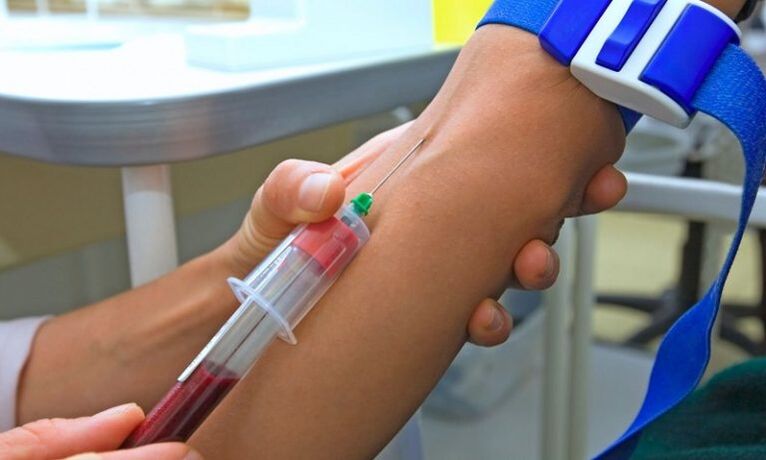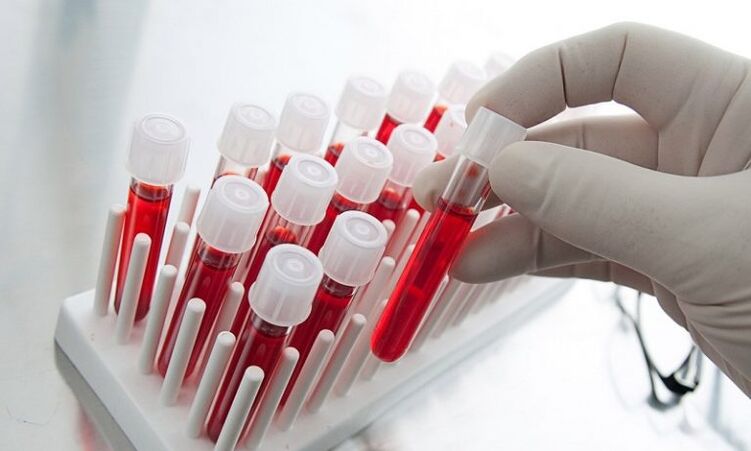At present, the diagnosis of prostatitis is a very simple procedure for a doctor. Despite the rare atypical forms of the disease, the diagnosis of acute prostatitis is relatively easy.

During the treatment of the disease, the patient must undergo a series of laboratory and instrumental examinations. Patients often wonder why they should have a general PSA blood test for prostatitis. Not everyone understands the role of this marker in the diagnosis of the underlying disease.
What is PSA?
Prostate-specific antigen (PSA) is a specific glycoprotein produced only by prostate gland cells. Its main role is the activation of sperm during liquefaction and ejaculation.
This protein can be found in the blood and only partially demonstrates its function and all kinds of lesions because it is produced in the prostate gland.
It is widely used in the diagnosis of diseases such as:
- Chronic prostatitis;
- benign prostatic hyperplasia - prostate adenoma;
- Malignant neoplasms of the male body - prostate cancer.
In chronic prostatitis, a common PSA blood test can show the course of the disease and a dangerous complication of the disease, which is manifested by degeneration of the damaged cells to those atypical with the development of prostate cancer.
Prostate-specific antigen is a tumor marker that can indicate the presence of a tumor at an early stage of development.
Normal indicators
Because protein is synthesized in the tissues of the male gland, it is normal to have a small amount of it in the blood. For normal functioning of a tumor marker, the screening limit is a value of up to 4 ng / ml in the blood.

The amount of protein directly depends on the following factors:
- The man's age. There is a definite relationship between the age of the patient and the activity of marker production by the diaper;
| Age, years | PSA index, ng / ml |
| 40-49 | 2. 5 |
| 50-59 | 3. 5 |
| 60-69 | 4. 5 |
| >70 | 6. 5 |
- Regularity of sexual intercourse;
- The presence of an inflammatory process in the prostate;
- Physical trauma and organ damage;
- Delayed surgeries or special diagnostic procedures (prostate massage, digital rectal examination);
- Take medicine.
All these aspects can affect the number of antigens in the bloodstream and can sometimes even confuse doctors. Therefore, it is important to know how to properly perform a PSA blood test for common male prostatitis so that subsequent therapy is successful.
PSA preparation
Before donating blood for the detection of a prostate-specific antigen, a man should observe some important points that prevent the misinterpretation of the final result.

To prevent laboratory errors, the patient should consider the following features:
- You should not eat for 8 hours before taking blood. You can drink tea, juice or water.
- 24 hours before the start of the study, cycling, stationary cycling or long-distance hiking (>5 km) Avoid.
- One week before the test, sexual intercourse and masturbation, spicy and smoked foods should be avoided.
- If the patient has had a transrectal ultrasound examination of the prostate (TRUS), a digital rectal examination, a colonoscopy, or a bladder catheterization, the patient should wait at least 7 days for a PSA to be determined.
- It is necessary to wait 2 weeks after prostate biopsy or prostate massage.
Only if all these rules are followed, it will be possible to say that the PSA blood test for general prostatitis will be really reliable.
Decoding and purposes of PSA tests
The main purpose of such an examination is to monitor the course of the chronic form of the disease and to quickly identify the problem if the prostate is malignant (tumor formation).
In diseases such as acute, chronic, bacterial, congestive prostatitis, PSA levels can rise slightly to 5 ng / ml. This is not a cause for panic yet. If the indicator does not return to normal after adequate drug treatment, it is considered an absolute indicator for organ puncture with subsequent histological examination.
Normally, the larger the prostate, the more cells can produce glycoprotein. It has been clinically proven that in benign hyperplasia, 1 gram of organ parenchyma additionally synthesizes 0. 35 ng / ml antigen. The same indicator for cancer is 3. 5 ng / ml.
This ratio allows doctors with a high degree of reliability to judge the likelihood of developing malignant neoplasms in chronic inflammation of the prostate gland. According to statistics, 83% of cancer patients simultaneously suffer from chronic inflammation of the testicles. This allows us to consider this pathology as a predictor of cancer.
The result
A blood test for PSA in prostatitis is part of the mandatory examination of urological patients. Its importance is difficult to overestimate, as it can reliably indicate the formation of atypical cell growth, which leads to the development of malignant neoplasms.
























